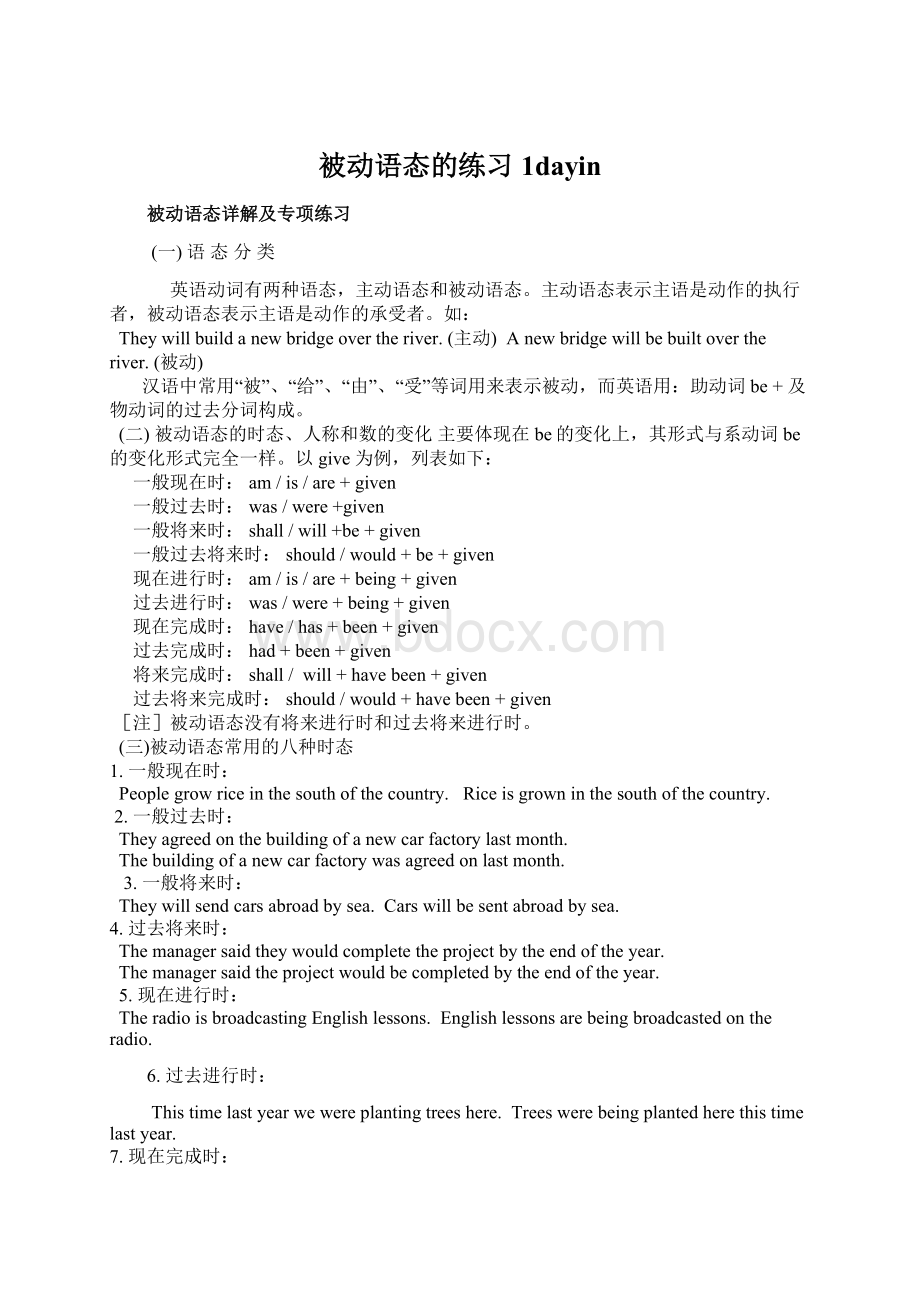被动语态的练习1dayin.docx
《被动语态的练习1dayin.docx》由会员分享,可在线阅读,更多相关《被动语态的练习1dayin.docx(8页珍藏版)》请在冰豆网上搜索。

被动语态的练习1dayin
被动语态详解及专项练习
(一)语态分类
英语动词有两种语态,主动语态和被动语态。
主动语态表示主语是动作的执行者,被动语态表示主语是动作的承受者。
如:
Theywillbuildanewbridgeovertheriver.(主动) Anewbridgewillbebuiltovertheriver.(被动)
汉语中常用“被”、“给”、“由”、“受”等词用来表示被动,而英语用:
助动词be+及物动词的过去分词构成。
(二)被动语态的时态、人称和数的变化 主要体现在be的变化上,其形式与系动词be的变化形式完全一样。
以give为例,列表如下:
一般现在时:
am/is/are+given
一般过去时:
was/were+given
一般将来时:
shall/will+be+ given
一般过去将来时:
should/would+be+given
现在进行时:
am/is/are+being+given
过去进行时:
was/were+being+given
现在完成时:
have/has+been+given
过去完成时:
had+been+given
将来完成时:
shall/ will+havebeen+given
过去将来完成时:
should/would+havebeen+given
[注]被动语态没有将来进行时和过去将来进行时。
(三)被动语态常用的八种时态
1.一般现在时:
Peoplegrowriceinthesouthofthecountry. Riceisgrowninthesouthofthecountry.
2.一般过去时:
Theyagreedonthebuildingofanewcarfactorylastmonth.
Thebuildingofanewcarfactorywasagreedonlastmonth.
3.一般将来时:
Theywillsendcarsabroadbysea. Carswillbesentabroadbysea.
4.过去将来时:
Themanagersaidtheywouldcompletetheprojectbytheendoftheyear.
Themanagersaidtheprojectwouldbecompletedbytheendoftheyear.
5.现在进行时:
TheradioisbroadcastingEnglishlessons. Englishlessonsarebeingbroadcastedontheradio.
6.过去进行时:
Thistimelastyearwewereplantingtreeshere. Treeswerebeingplantedherethistimelastyear.
7.现在完成时:
Someonehastoldmethesportsmeetmightbeputoff. Ihavebeentoldthesportsmeetmightbeputoff.
8.过去完成时:
WhenIgottothetheatre,Ifoundtheyhadalreadysoldoutthetickets.
WhenIgottothetheatre,Ifoundtheticketshadalreadybeensoldout.
9.含有情态动词的被动语态:
含有情态动词的被动语态是由“情态动词+be+及物动词的过去分词”构成。
Youmusthandinyourcompositionsafterclass.
Yourcompositionsmustbehandedinafterclass.
(四)被动语态的使用
1.当不知道或没有必要指出动作的执行者时,常用被动语态,这时往往不用by短语。
“Mr.White,thecupwithmixturewasbrokenafterclass.”
(只是告诉老师杯子坏了,不知是谁弄坏的,或不想说出谁弄坏的)。
2.突出或强调动作的承受者,如果需要说出动作的执行者,用by短语。
TheserecordsweremadebyJohnDenver.
Myunclegavemeapresentonmybirthday.
如果把直接宾语(指物)改为主语,则在间接宾语(指人)前加适当的介词,如上句还可以说:
Apresentwasgiventomeyesterday.
注意:
一般在下列动词后,常在间接宾语前用介词to,如:
bring,give,hand,lend,offer,pass,pay,promise,sell,show,take,teach,tell等。
Thecupwithmixturewasshowedtotheclass.
Mybikewaslenttoher.
一般在下列动词后,间接宾语前用介词for,如:
build,buy,cook,cut,choose,do,fetch,find,fix,get,keep,make,order,paint,play,sing等。
Mothermademeanewskirt. (Anewskirtwasmadeforme. )
Themeatwascookedforus. Somecountrymusicwasplayedforus.
有些既不用to也不用for,根据动词与介词的搭配关系。
Heaskmeaquestion. (Aquestionwasaskedofme. )
PeopleallovertheworldknowtheGreatWall.
TheGreatWallisknowntopeopleallovertheworld.(不用by短语)
3.由动词+介词或副词构成的短语动词,要把它们作为整体看,即把它们看成一个及物动词,介词或副词不可拆开或漏掉。
这类动词有:
不及物动词+介词,如:
agreeto,askfor,laughat,operatedon,listento,lookafter,thinkof,talkabout等。
Thepatientisbeingoperatedon.
Theproblemissolved.Itneedn'tbetalkedabout.
及物动词+副词:
如:
bringabout,carryout,findout,giveup,handin,makeout,passon,pointout,putaway,putoff,thinkover,turndown,workout,turnout等。
Hisrequestwasturneddown.
Thesportsmeetwillbeputoffbecauseofthebadweather.
4.带复合宾语(宾语+宾补)的动词改为被动语态时,一般把主动结构中的宾语改为主语,而宾语补足语保留在谓语动词后面。
如:
Wealwayskeeptheclassroomclean.
→Theclassroomisalwayskeptclean.
Shetoldustofollowherinstructions.
→Weweretoldtofollowherinstructions.
注意:
在see,watch,hear,notice,listento,lookat,make,feel等动词后作宾语补足语的动词不定式都不带to,但改成被动语态后都带to,这时不定式为主语补足语,也就是说不定式作主语补足语不存在省略to的问题。
Weoftenhearhimplaytheguitar.
→Heisoftenheardtoplaytheguitar.
注意:
带有复合宾语的句子,如果宾语补足语是名词,变被动句时,应将宾语变为主语,不要误把宾语补足语的名词作主语。
如:
TomatoeswerefirsttakenbacktoEuropeandpeoplecalledthemloveapples.
误:
Loveappleswerecalledthem.
正:
Theywerecalledloveapples.
5.还有一种短语动词由动词+名词+介词构成,变被动语态有两种形式,如下:
1)Wetakegoodcareofthebooks.
Thebooksaretakengoodcareof.
Goodcareistakenofthebook.
2)Youmustpayattentiontoyourpronunciation.
Attentionmustbepaidtoyourpronunciation.
Yourpronunciationmustbepaidattentionto.
用于这类结构的短语动词常见的有:
catchsightof,makeuseof,payattentionto,setfireto,takecareof,takeholdof,takenoticeof,keepaneyeon等。
6.当主动句的主语是nobody,noone等含有否定意义的不定代词时,被动句中将其变为anybody,作by的宾语,并将谓语动词变为否定的被动语态。
如:
Nobodycananswerthisquestion.
误:
Thequestioncanbeansweredbynobody.
正:
Thequestioncannotbeansweredbyanybody.
7.当否定句中的宾语是anything,anybody,anyone等不定代词时,在被动句中应将其分别变为nothing,nobody,noone作主语,并将谓语动词变为肯定的被动语态。
如:
Theyhaven'tdoneanythingtomaketheriverclean.
误:
Anythinghasn'tbeendonetomaketheriverclean.
正:
Nothinghasbeendonetomaketheriverclean.
9.有些动词既是及物又是不及物,当它们和well,badly,easily等副词连用时,表示主语内在品质或性能,是不及物动词,用主动表示被动,这时不用被动语态,常见的有:
write,read,clean,sell,wash,cook等。
如:
Theclothwasheseasily. 这布很好洗。
Thenewproductsellswell. 这新产品很畅销。
Thepenwritessmoothly. 这支笔写字很流畅。
对比:
Thebookssellwell.(主动句) Thebooksweresoldout.(被动句) Themeatdidn’tcookwell.(主动句) Themeatwascookedforalongtimeoverlowheat.(被动句)
10.下列情况主动句不能改为被动句:
第一,感官系动词一般用主动形式表示被动意义,如:
feel,look,seem,taste,sound,remain等。
—Doyoulikethematerial?
—Yes,itfeelsverysoft. 误:
Itisfeltverysoft.
Thefoodtastesdelicious. 误:
Thefoodistasteddelicious.
Thepopmusicsoundsbeautiful. 误:
Thepopmusicissoundedbeautiful.
第二,谓语是及物动词leave,enter,reach,suit,have,benefit,lack,own等。
如:
Heenteredtheroomandgothisbook. 误:
Theroomwasenteredandhisbookwasgot.
Shehadherhandburned. 误:
Herhandwashadburned.
第三,一些不及物动词短语没有被动语态,如:
takeplace,breakout,belongto,loseheart,consistof,addupto等。
如:
Thefirebrokeoutinthecapitalbuilding. 误:
Thefirewasbrokeoutinthecapitalbuilding.
第四,不及物动词没有被动语态,如:
rise,happen,succeed,remain,lie等。
Whenwegottothetopofthemountain,thesunhadalreadyrisen.
误:
Thesunhadalreadybeenrisen.
Aftertheearthquake,fewhousesremained.
误:
Aftertheearthquake,fewhouseswereremained.
第五,宾语是反身代词,相互代词,同源宾语,不定式,v-ing形式及抽象名词等,不能变为被动句子的主语,如:
ItaughtmyselfEnglish. 误:
MyselfwastaughtEnglish.
Weloveeachother. 误:
Eachotherisloved.
11.在汉语中,有一类句子不出现主语,在英语中一般可用被动结构来表示,例如:
据说……Itissaidthat… 据报导……Itisreportedthat… 据推测……Itissupposedthat…
希望……Itishopedthat… 众所周知……Itiswellknownthat…
普遍认为……Itisgenerallyconsideredthat… 有人建议……Itissuggestedthat…
1)Itisreportedthatitisgoingtoraintomorrow. 2)ItiswellknownthatThomasEdisoninventedtheelectriclamp.
在英语语言中,被动语态是极常见的语言现象,人们进行语言交际,离不开对被动语态的使用,熟练掌握被动语态也为下一步学习打下良好的基础,在动词-ing形式,不定式等结构中,都有被动式,都需要运用被动语态的知识去理
被动语态专项练习
一、选择题
( )1._____anewlibrary_____inourschoollastyear?
A.Is;built B.Was;built C.Does;build D.Did;build
( )2.Anaccident____onthisroadlastweek.
A.hasbeenhappened B.washappened C.ishappened D.happened
( )3.Cotton(棉花)____inthesoutheastofChina.
A.isgrown B.aregrown C.grows D.grow
( )4.Sofar,themoon____bymanalready.
A.isvisited B.willbevisited C.hasbeenvisited D.wasvisited
( )5.AtalkonChinesehistory_____intheschoolhallnextweek.
A.isgiven B.hasbeengiven C.willbegiven D.gives
( )6.Howmanytrees____thisyear?
A.areplanted B.willplant C.havebeenplanted D.planted
( )7.Alotofthings____bypeopletosavethelittlegirlnow.
A.aredoing B.arebeingdone C.hasbeendone D.willbedone
( )8.--When___thiskindofcomputers______?
--Lastyear.
A.did;use B.was;used C.is;used D.are;used
( )9.TheGreatWall____allovertheworld.
A.knows B.knew C.isknown D.wasknown
( )10.Who_____thisbook_____?
A.did;written B.was;writtenby C.did;written D.was;written
( )11.Astory_____byGrannyyesterday.
A.wastoldus B.wastoldtous C.istoldus D.toldus
( )12.Themonkeywasseen_____offthetree.
A.jump B.jumps C.jumped D.tojump
( )13.Theschoolbag___behindthechair.
A.puts B.canbeput C.canbeputted D.canput
( )14.Olderpeople____well.
A.looksafter B.mustbelookedafterC.mustlookafterD.lookedafter
( )15.Ourteacher______carefully.
A.shouldbelistenedtoB.shouldbelisten C.belistened D.islistened
16.ThisisTed’sphoto.Wemisshimalot.He______tryingtosaveachildintheearthquake.
A.killedB.iskilledC.waskilledD.waskilling
17.Rainforests______andburnedatsuchaspeedthattheywilldisappearfromtheearthinthenearfuture.
A.cutB.arecutC.arebeingcutD.hadbeencut
18.Selectingamobilephoneforpersonaluseisnoeasytaskbecausetechnology_______sorapidly.
A.ischangingB.haschangedC.willhavechangedD.willchange
19.Hundredsofjobs_______ifthefactorycloses.
A.loseB.willbelostC.arelostD.willlose
20.Anewcinema_______here.Theyhopetofinishitnextmonth.
A.willbebuiltB.isbuiltC.hasbeenbuil